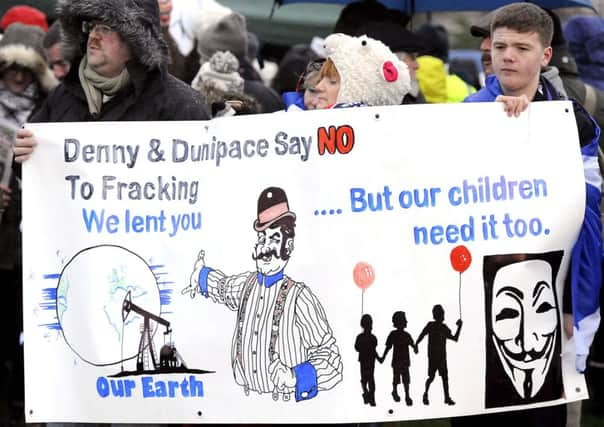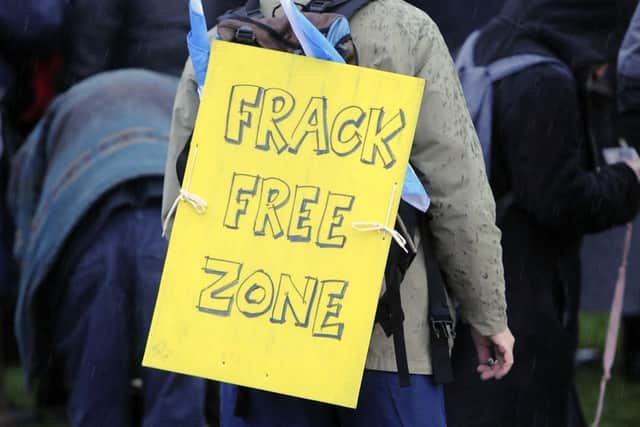‘Ban fracking until major concerns are addressed’


The cross-party environmental audit committee (EAC) warned extensive production of unconventional shale gas, which is extracted through the controversial fracking process, is not compatible with the UK’s goals to cut greenhouse gas emissions.
The committee also called for the practice to be “prohibited outright” in protected areas, such as national parks, areas of outstanding natural beauty and ancient woodlands, and banned in all water-source protection zones.
Advertisement
Hide AdAdvertisement
Hide AdIn a report published ahead of a final House of Commons debate today on fracking legislation in the Infrastructure Bill, the committee warned of an “extensive range of uncertainties” over hazards, ranging from polluted groundwater and water supplies to noise and disruption. There was also a lack of public acceptance of fracking, it said.


FOLLOW US
-----------------------------------------
-----------------------------------------
SCOTSMAN TABLET AND MOBILE APPS
A number of the MPs on the committee have tabled an amendment to the Infrastructure Bill calling for a moratorium on fracking for shale gas to reduce the risk of the UK missing its targets to cut carbon emissions.
If the amendment wins a majority, it will block any new licences for fracking across the UK, including Scotland, until powers are devolved to Holyrood after May’s general election.
The UK government has said it is going “all out” to develop a shale industry, claiming it would create jobs and growth, reduce energy prices and cut the country’s reliance on gas imports.
Supporters of exploiting the unconventional gas also claim it could be a “transition” fuel, helping move the UK away from the most polluting fossil fuel, coal, towards a cleaner energy supply. But the MPs said shale gas could not be considered a transition fuel as any large-scale extraction would be at least ten to 15 years away, by which time dirtier coal would already have been phased out to meet EU rules on emissions.
The threat to the UK government’s plans comes after Scottish Labour leader Jim Murphy announced last week that he would move to ban fracking in Scotland until environmental concerns are addressed and then allow communities a veto over exploration.
The SNP is also in favour of a moratorium on fracking and confirmed it will vote for the move across the UK at Westminster today.
The hardening of Labour’s stance on fracking will be seen as a threat to the plans from the operator of the Grangemouth site, Ineos, which bought the majority share of a shale gas exploration licence for Scotland in a deal worth tens of millions of pounds last year.
Advertisement
Hide AdAdvertisement
Hide AdAhead of today’s debate in the House of Commons, the MPs said the shale industry would not be commercially viable unless developed at a scale so it could compete with renewables. However, large-scale fracking cannot fit within increasingly smaller green budgets for how much carbon the UK can emit.
The MPs added: “A moratorium on the extraction of unconventional gas through fracking is needed to avoid both the inconsistency with our climate-change obligations and to allow the uncertainty surrounding environmental risks to be fully resolved.”
The committee’s chairwoman, Labour MP Joan Walley, said fracking could not be compatible with long-term commitments to cut greenhouse gas emissions unless full-scale technology which captures and permanently stores carbon was rolled out rapidly – something which looked unlikely.
“There are also huge uncertainties around the impact that fracking could have on water supplies, air quality and public health,” she said.
She added: “We cannot allow Britain’s national parks and areas of outstanding natural beauty to be developed into oil and gas fields. Even if a national moratorium on shale drilling in the UK is not accepted, there should be an outright ban on fracking in such special sites.”
The committee criticised changes to trespass laws to allow fracking without residents’ permission as having serious implications for citizens’ rights, with Ms Walley calling on parliament to throw out the “profoundly undemocratic” proposals.
To coincide with the final debate on the bill, which has seen amendments on fracking tabled, a protest is being held outside parliament, which includes speeches by Vivienne Westwood, Bianca Jagger, and former UK climate envoy John Ashton.
A spokesman for the Department of Energy and Climate Change said: “We disagree with the conclusion of this report. We have one of the most robust regulatory regimes for shale gas.
Advertisement
Hide AdAdvertisement
Hide Ad“UK shale development is compatible with our goal to cut greenhouse gas emissions and does not detract from our support for renewables; in fact it could support development of intermittent renewables.”
SEE ALSO: